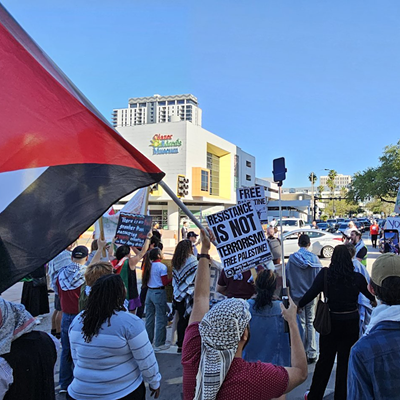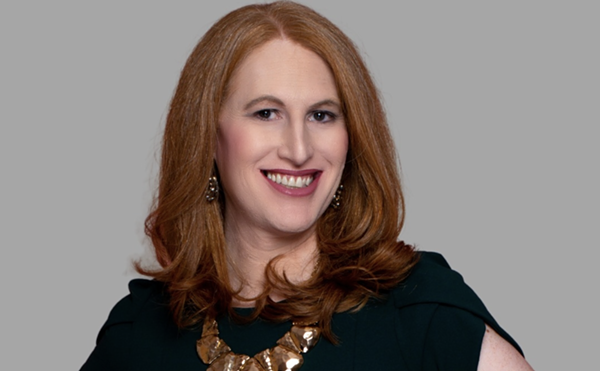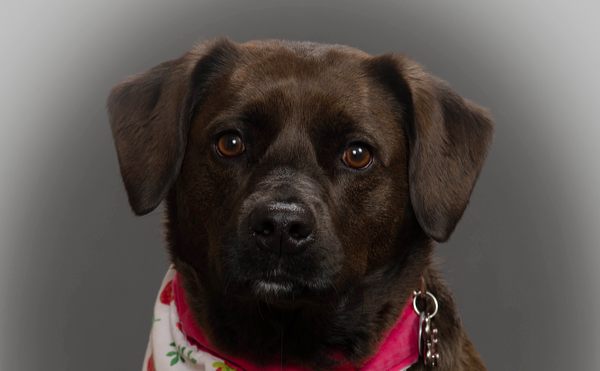Chief among the archetypes and apocrypha, myths and clichés that haunt the music of the black South is this one: The ambitious journeyman who disappears into the dark countryside, meets the devil at the crossroads, sells his soul and returns a blues master.
Of course, the devil, having long since come to collect his bill on the blues, moved on to other prizes. The spirit of the music has reincarnated in other Southern inventions, from rock to soul to funk. And today, it's hip-hop — not Southern by birth, but warmly lavished in Southern hospitality and, having been imbued with the region's unique flavor, adopted as family.
And still, the ghost of that blues fable remains very much alive in the best music of the black South. Its residue survives in hip-hop, running through the region's many shades, from bass in Florida to bounce in Louisiana to screw in Texas to crunk in Georgia. The dark countryside where you meet the devil at the crossroads: It's the shadowy code that runs right up through the South's two current magnetic poles of modern urban pop, Atlanta and Virginia Beach.
But what is the black South today? Is it the dark countryside, sufficiently deserted for devils to lurk with impunity? Or is it the crossroads, a conduit leading to and coming from other places? Depends who you ask, and which pole you're at.
Before it was a city, Atlanta was just a crossroads. Back in railroad days, old Terminus was grown from the spot where two lines of track met. Where most cities in the history of world civilization had the sense to plop down on the banks of some great body of water, Atlanta tied its fortunes to land transportation and has been suffering the results of water lust and traffic congestion ever since.But the crossroads have yielded advantages as well. After the fall, when the fortunes of the South started looking up and the age of the automobile arrived, Atlanta was better positioned than any other city to assert itself as the regional nucleus. Now a crossing of highways instead of rail tracks, the city is still defined by its roads — geographically, politically, culturally, even psychologically. As ever, the city is not some immovable monolith, but a porous organism defined by the constant flow of capital in and out and through. What is Atlanta? It's eager to please — what do you want it to be?
Now, the first rap music to appear down South was not merely a spin-off of the original Boogie Down Bronx style. The common ancestral homeland to all strains of hip-hop was Jamaica, which sprouted the reggae practices of dub (remixing) and toasting (rhythmic chanting over dubs). It first got carried across the Caribbean to these shores during the Carter administration (maybe Ford). By the time it landed in Miami, reggae's latest permutation — the fast-paced, beat-machine-fueled, sexually charged style known as dancehall — had defined itself. Floridians took dancehall's tinny beats, booming low-end and nasty-as-they-wanna-be lyrics, mixed in bits of the rap that had dribbled down from New York (itself an adaptation of reggae's DJ culture), and whoomp, there it was: bass music.
Miami bass' infernal rumble sounded best on four wheels. As much a physical experience as an aural one, bass made your trunk rattle like "two midgets in the backseat wrasslin'." By nature, it traveled. First up I-95 to Jacksonville and across the Sunshine State, it then rumbled quickly northward on I-75 until it hit the crossroads with I-85 and I-20: Atlanta.
But just as bass music blew in from the South and settled down as Atlanta's first local hip-hop sound, other influences began arriving from other directions. This was the late '80s, and in New York, Afrocentric rap was all the rage — in particular, the kinder/gentler brand of Native Tongues crew members De La Soul and A Tribe Called Quest. While the inflated self-esteem otherwise known as boasting has always fueled rap's engine, Afrocentrism made primary a more authentic, earnest brand of identity exhibitionism. The new school recast hip-hop as a forum to assert cultural pride, and it sent ripples way beyond the Afrocentrics (and New York-centrics). Suddenly, you had Irish rappers and Asian rappers, Indian rappers and Jewish rappers, all applying Native Tongues-style odes of self-appreciation to their own ethnicities. And if Southern ain't officially an ethnic group, don't tell the dudes in the SWATS (southwest Atlanta). You might find yourself cleansed from that particular enclave.
And right when the Native Tongues helped awaken Southern pride in Atlanta rappers, Afrocentrism found its currency usurped by a new sound traveling in from way out West. Insanely catchy in its untwisting of P-Funk's maggot-brained melodies, slumping through clouds of reefer smoke, this was the G-funk typified by Dr. Dre's The Chronic. It connected with Atlanta's aspiring hip-hoppers in a way that few other records had. After all, New York was all subway and concrete, while Atlantans could more easily relate to the wide rims, low rides and weekend barbecues being projected out of south L.A.
And so it was just a matter of time before the ATLien alchemists met at the crossroads. They mixed the booming bass coming in along I-75 with the laid-back funk groove pulling up on I-20 and the self-consciousness riding dirty on I-85 to create something new — something distinctly Southern, and yet, something that ultimately transcends region. Call it Southernplayalisticadillac muzik. This was the fission that produced OutKast.
Just one highway leads in and out of Virginia Beach. Interstate 264 heads east toward the coast and suddenly ends, dropping you onto a grid of streets that lines the older part of town. But the new part of town makes up most of Virginia Beach — particularly the parts where the black folks live. The faceless stretch of suburbia was melded together with the original beach town 40 years ago to create a city boasting a population that approaches a half-million. With the beach catering to tourists, the actual heart of Virginia Beach for the locals is this drab, centerless accumulation of avenues. How do you know Virginia Beach when you get there? You don't — there's no there there.The entire Tidewater area, taken together, is a wonderfully waterlogged network of land masses separated by rivers and harbors, connected by bridges and dotted with majestic ships from the area's many military bases. But its position at the end of a highway makes it a true backwater. You can't just be passing through on your way — it's a place you have to seek out to end up. It's the dark countryside of Southern music mythology, the idle lands that are the devil's playground.
In hip-hop terms, Virginia Beach was a forgotten outpost of an entire lost region. While every corner of the country asserted a local flavor through the late '90s, the stretch of states from Maryland down to the Carolinas remained largely silent. But where circumstance leaves a vacuum, the imagination eventually fills in. In place of any identifiable tradition, and largely untouched by the crosswinds of influence blowing in from other places, a few possessed Virginians conjured a sound-world made entirely from false memory and limitless possibility.
And so, from the place where the highway ends came wholly new sound terrains for hip-hop, served up in tracks credited to producers like Timbaland (with his collaborator Missy Elliott), or Pharrell Williams and Chad Hugo of the Neptunes. Unconnected to region, this is music that was brewed in secret, behind-the-scenes in a place no one would find, then exported and turned into hits for just about anyone. Compositions that carved out the beautifully contoured funk in asymmetrical little chunks, from bits of Indian bling and Chinese twang to Appalachian wail to Miami swing — stuff that wrestled cohesive, catchy slabs of gold from the most unpredictable free-roaming isotopes. And then, to really show how they've just scratched the surface in this game, the Virginians flip it in reverse and run it all back for us.
What is the black South today? Confounding all stereotypes, it's a place where some of the most sophisticated, essential, outward-looking, inward-delving urban pop gets made. Was it ever any different? Indeed, the shadow of legend runs deep.














